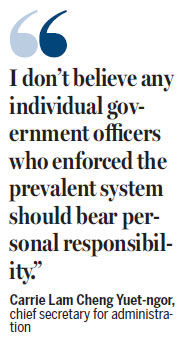Government unprepared for lead water crisis: Lam
Updated: 2015-10-09 09:32
By Joseph Li in Hong Kong(HK Edition)
|
|||||||||
Chief secretary considers updating the law but stops short of blaming officials
The government had inadequate knowledge of the impact of lead contaminated water on public health, Chief Secretary for Administration Carrie Lam Cheng Yuet-ngor admitted.
However, since the first case of excessive lead in drinking water surfaced on July 10, the government has taken several remedial steps. These include the examination of drinking water in public housing estates and schools, and blood tests for residents.
Lam discussed the issue at a Legislative Council House Committee special meeting on Thursday. She said that among tests of the 4,740 water samples collected from 11 public housing estates built after 2005, only 91 (or 2 percent) were found to contain excessive lead. The Hospital Authority conducted blood tests on 4,890 residents. But only 3 percent of them had lead levels slightly above normal standards.
Pipes have been connected to each floor of the affected housing estates and water filters have also been installed in households. But the most thorough solution was to replace water pipes, Lam said. To ease people's concerns, the government would consider random examinations of filtered drinking water.
She would also consider lawmakers' demands to exempt the affected public housing estate tenants from paying rents and water charges.

Acting secretary for transport and housing Yau Shing-mu told the meeting the Housing Authority would extend water tests to public housing estates built before 2005.
The tenders of the four building contractors involved, submitted between March and September, would not be considered. But the authority's tender committee this month will decide whether there should be a longer "suspension period".
The chief secretary said that the system is faulty because it does not require examination of the welded parts of the water pipes to find out if they contain lead. It also does not require additional water tests to ascertain the level of lead in drinking water.
Lam said she did not believe any individual government officers who enforced the prevalent system should bear personal responsibility. But later in the meeting, she said she would seriously review the law to ensure the safety of drinking water.
However, some lawmakers were unhappy with Lam's answer that it was only the system which was at fault and individual public officers should not bear responsibility.
Lawmaker Christopher Chung Shu-kun, from the Democratic Alliance for the Betterment and Progress of Hong Kong, said the Housing Department and Water Supplies Department failed to supervise the contractors.
Dennis Kwok Wing-hang of the Civic Party said the Waterworks Ordinance was outdated and should be revised. Instead of using public funds, he suggested the relevant contractors set up a fund to compensate the victims in case of claims.
(HK Edition 10/09/2015 page6)